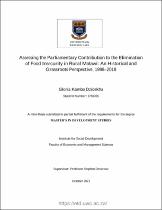Assessing the parliamentary contribution to the elimination of food insecurity in rural Malawi: An historical and grassroots perspective, 1998–2018
| dc.contributor.advisor | Devereux, Stephen | |
| dc.contributor.author | Dzidekha, Gloria Kombo | |
| dc.date.accessioned | 2022-11-07T09:15:47Z | |
| dc.date.available | 2022-11-07T09:15:47Z | |
| dc.date.issued | 2022 | |
| dc.identifier.uri | http://hdl.handle.net/11394/9412 | |
| dc.description | Magister Artium (Development Studies) - MA(DVS) | en_US |
| dc.description.abstract | Although Malawi is an agriculture-based economy, the country experiences extensive food insecurity, hunger, malnutrition, low productivity, and low income. Currently, food insecurity affects 58% of the population and 50.7% of the population live below the poverty line. In Malawi, parliament is key in the legal and policy-making processes. It also has a constitutional mandate to represent the people’s interests and basic needs – in this case, food security, a fundamental human right; however, food insecurity still persists. The study assesses the parliamentary contribution to the legislation of policy that aims at reducing food insecurity. It examines the trajectory of the food security policy in the Malawi Legislature and its effectiveness, from the perspectives of citizens and Members of Parliament (MPs). | en_US |
| dc.language.iso | en | en_US |
| dc.publisher | University of the Western Cape | en_US |
| dc.subject | Food security | en_US |
| dc.subject | Political economy | en_US |
| dc.subject | Agriculture | en_US |
| dc.subject | Malnutrition | en_US |
| dc.subject | Malawi | en_US |
| dc.title | Assessing the parliamentary contribution to the elimination of food insecurity in rural Malawi: An historical and grassroots perspective, 1998–2018 | en_US |
| dc.rights.holder | University of the Western Cape | en_US |

